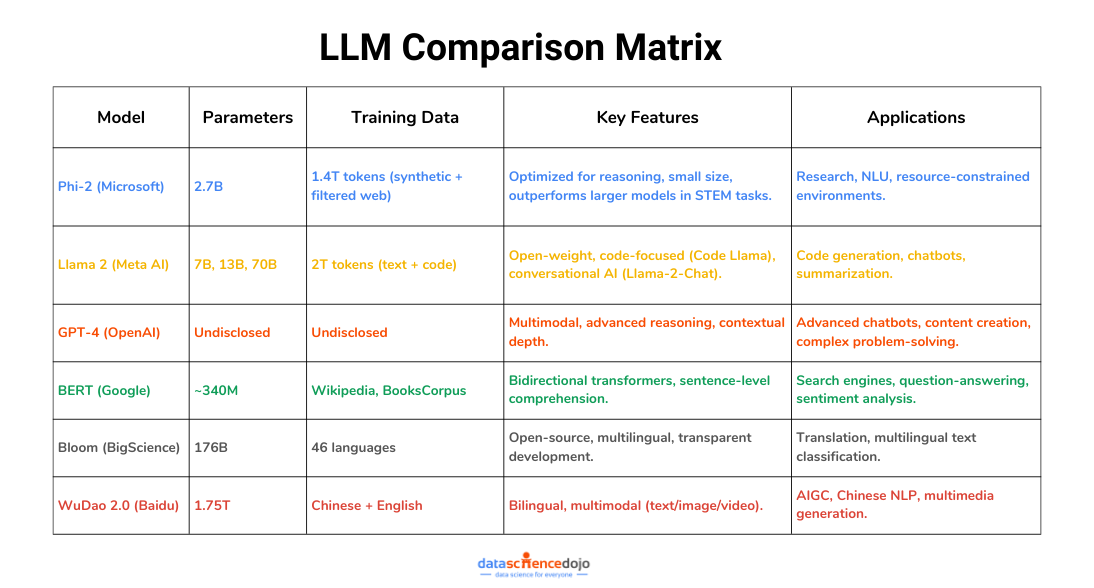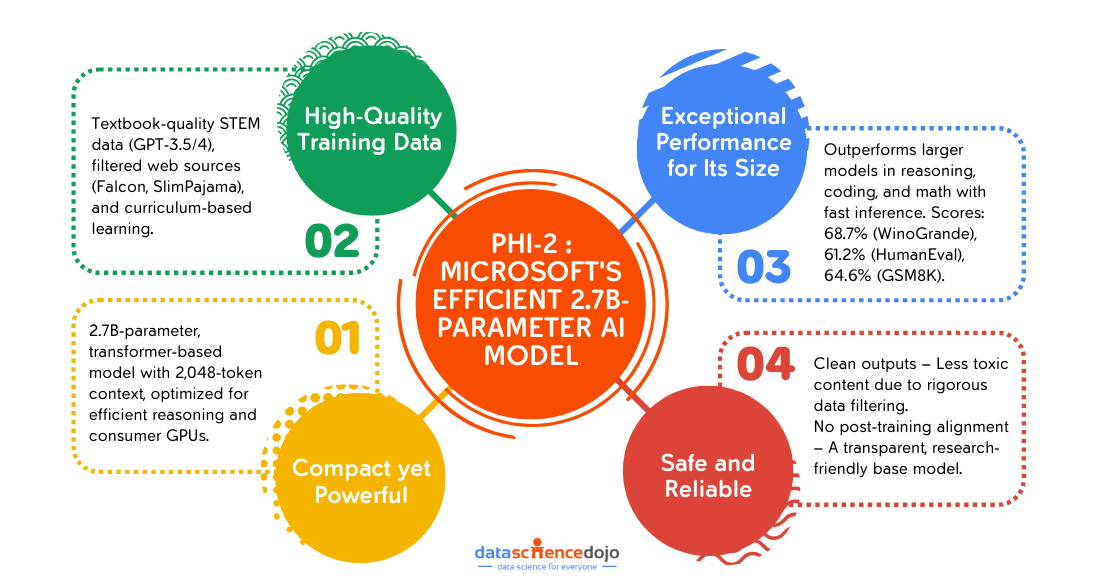Have you heard about Microsoft’s latest tech marvel in the AI world? It’s called Phi-2, a nifty little language model that’s stirring up quite the excitement.
Despite its compact size of 2.7 billion parameters, this little dynamo is an upgrade from its predecessor, Phi-1.5. What’s cool is that it’s all set and ready for you to explore in the Azure AI Studio model catalogue.
Now, Phi-2 isn’t just any small language model. Microsoft’s team, led by Satya Nadella, showcased it at Ignite 2023, and guess what? They say it’s a real powerhouse, even giving the bigger players like Llama-2 and Gemini-2 a run for their money in generative AI tests.
This model isn’t just about crunching data; it’s about understanding language, making sense of the world, and reasoning logically. Microsoft even claims it can outdo models 25 times their size in certain tasks.
Read in detail about: Google launches Gemini AI
But here’s the kicker: training Phi-2 is a breeze compared to giants like GPT-4. It gets its smarts from a mix of high-quality data, including synthetic sets, everyday knowledge, and more. It’s built on a transformer framework, aiming to predict the next word in a sequence. And the training? Just 14 days on 96 A100 GPUs. Now, that’s efficient, especially when you think about GPT-4 needing up to 100 days and a whole lot more GPUs!
Comparative analysis of Phi-2
Comparing Phi 2, Llama 2, and other notable language models can provide insights into their unique strengths and applications.
-
Phi 2 (Microsoft):
- Size & Architecture: Transformer-based architecture optimized for next-word prediction, with a 2048-token context window.
- Training Data: Trained on 1.4 trillion tokens, including synthetic “textbook-quality” datasets (generated with GPT-3.5/GPT-4) and filtered web data (e.g., Falcon RefinedWeb, SlimPajama). Focuses on STEM, common sense, and theory of mind.
- Performance: Outperforms larger models like Mistral-7B and Llama-2-13B/70B in coding, math, and reasoning benchmarks.
- Efficiency: Designed for fast inference on consumer-grade GPUs.
Applications
- Research in language model efficiency and reasoning.
- Natural language understanding (NLU) tasks.
- Resource-constrained environments (e.g., edge devices).
Limitations
- Not aligned with human preferences (no RLHF), so outputs may require filtering.
-
Llama 2 (Meta AI)
- Size & Variants: Available in 7B, 13B, and 70B parameter versions (not 65B). Code Llama variants specialize in programming languages.
- Training Data: Trained on 2 trillion tokens, including text from Common Crawl, Wikipedia, GitHub, and public forums.
- Performance:
- Licensing: Free for research and commercial use (under 700M monthly users), but not fully open-source by OSI standards.
Applications
- Code generation and completion (via Code Llama).
- Chatbots and virtual assistants (Llama-2-Chat).
- Text summarization and question-answering.
Also learn about Claude 3.5 Sonnet
-
Other Notable Language Models
1. GPT-4 (OpenAI)
- Overview: A massive multimodal model (exact size undisclosed) optimized for text, image, and code tasks.
- Key Features:
- Superior reasoning and contextual understanding.
- Powers ChatGPT Plus and enterprise applications.
- Applications: Advanced chatbots, content creation, and complex problem-solving.
2. BERT (Google AI)
- Overview: Bidirectional transformer model focused on sentence-level comprehension.
- Key Features:
- Trained on Wikipedia and BooksCorpus.
- Revolutionized search engines (e.g., Google Search).
- Applications: Sentiment analysis, search query interpretation.
3. Bloom (BigScience)
- Overview: Open-source multilingual model with 176B parameters.
- Key Features:
- Trained in 46 languages, including underrepresented ones.
- Transparent development process.
- Applications: Translation, multilingual text classification.
4. WuDao 2.0 (Baidu & Tsinghua University)
- Overview: A 1.75 trillion parameter model trained on Chinese and English data.
- Key Features:
- Handles text, image, and video generation.
- Optimized for Chinese NLP tasks.
- Applications: AIGC (AI-generated content), bilingual research.
Phi-2 Features and Capabilities
Phi-2 stands out for several key features and capabilities including:
Key Features
1. Compact yet Powerful Architecture
- Transformer-Based Design: Built as a decoder-only transformer optimized for next-word prediction, enabling efficient text generation and reasoning.
- Small Parameter Count: At 2.7 billion parameters, it is lightweight compared to models like Llama 2-70B (70B) or GPT-4 (1.76T), making it ideal for deployment on consumer-grade GPUs (e.g., NVIDIA A100, RTX 3090).
- Extended Context Window: Supports sequences of up to 2,048 tokens, allowing it to handle multi-step reasoning tasks and maintain coherence in longer outputs.
2. High-Quality, Curated Training Data
- Synthetic “Textbook-Quality” Data:
- Generated using GPT-3.5/GPT-4 to create structured lessons in STEM, common-sense reasoning, and theory of mind.
- Focuses on logical progression (e.g., teaching physics concepts from basics to advanced principles).
- Filtered Web Data:
- Combines cleaned datasets like Falcon RefinedWeb and SlimPajama, rigorously scrubbed of low-quality, toxic, or biased content.
- Curriculum Learning Strategy:
- Trains the model on simpler concepts first, then gradually introduces complexity, mimicking human educational methods.
3. Exceptional Performance for Its Size
- Outperforms Larger Models:
- Surpasses Mistral-7B and Llama-2-13B/70B in reasoning, coding, and math tasks.
- Example benchmarks:
- Common-Sense Reasoning: Scores 68.7% on WinoGrande (vs. 70.1% for Llama-2-70B).
- Coding: Achieves 61.2% on HumanEval (Python), outperforming most 7B–13B models.
- Math: 64.6% on GSM8K (grade-school math problems).
- Speed and Efficiency:
- Faster inference than larger models due to its compact size, with minimal accuracy trade-offs.
4. Focus on Safety and Reliability
- Inherently Cleaner Outputs:
- Reduced toxic or harmful content generation due to rigorously filtered training data.
- No reliance on post-training alignment (e.g., RLHF), making it a “pure” base model for research.
- Transparency:
- Microsoft openly shares details about its training data composition, unlike many proprietary models.
5. Specialized Capabilities
- Common-Sense Reasoning:
- Excels at tasks requiring real-world logic (e.g., “If it’s raining, should I carry an umbrella?”).
- Language Understanding:
- Strong performance in semantic parsing, summarization, and question-answering.
- STEM Proficiency:
- Tackles math, physics, and coding problems with accuracy rivaling models 5x its size.
6. Deployment Flexibility
- Edge Device Compatibility:
- Runs efficiently on laptops, IoT devices, or cloud environments with limited compute.
- Cost-Effective:
- Lower hardware and energy costs compared to massive models, ideal for startups or academic projects.
Applications
- Research:
- Ideal for studying reasoning in small models and data quality vs. quantity trade-offs.
- Serves as a base model for fine-tuning experiments.
- Natural Language Understanding (NLU):
- Effective for tasks like text classification, sentiment analysis, and entity recognition.
- Resource-Constrained Environments:
- Deployable on edge devices (e.g., laptops, IoT) due to low hardware requirements.
- Cost-effective for startups or academic projects with limited compute budgets.
- Education:
- Potential for tutoring systems in STEM, leveraging its synthetic textbook-trained knowledge.
Limitations
- No Alignment: Unlike ChatGPT or Llama-2-Chat, Phi-2 lacks reinforcement learning from human feedback (RLHF), so outputs may require post-processing for safety.
- Niche Generalization: Struggles with highly specialized domains (e.g., legal or medical jargon) due to its focus on common sense and STEM.
- Multilingual Gaps: Primarily trained on English; limited non-English capabilities.
Why These Features Matter
Phi-2 challenges the “bigger is better” paradigm by proving that data quality and architectural precision can offset scale. Its features make it a groundbreaking tool for:
- Researchers studying efficient AI training methods.
- Developers needing lightweight models for real-world applications.
- Educators exploring AI-driven tutoring systems in STEM.
Read in detail about: Multimodality revolution
In summary, while Phi 2 and Llama 2 are both advanced language models, they serve different purposes. Phi 2 excels in language understanding and reasoning, making it suitable for research and development, while Llama 2 focuses on code generation and software development applications. Other models, like GPT-3 or BERT, have broader applications and are often used in content generation and natural language understanding tasks.






